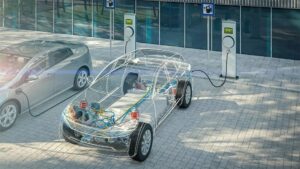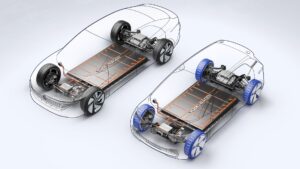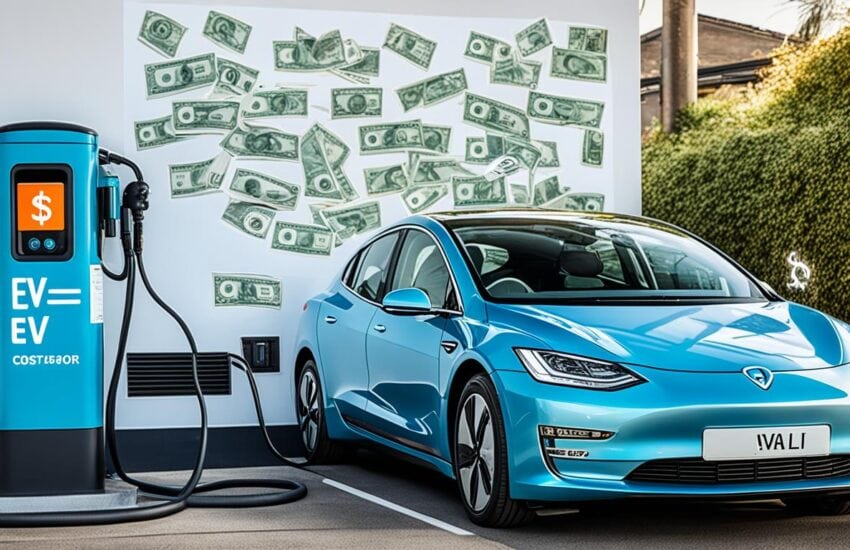The latest EV vs Petrol car benefits resulted in 41% of Americans considering buying an electric vehicle as their next car. That’s a significant shift towards cleaner and more sustainable transportation options. With the rising popularity of electric cars, it’s essential to compare the latest benefits of petrol-powered cars versus electric vehicles (EVs). The decision between the two can have long-term financial and environmental implications.
When it comes to upfront costs, EVs may have a higher price tag compared to petrol cars. However, the savings in maintenance, repair, and fuel costs over the lifetime of an EV can make them a better financial deal. According to a study by Consumer Reports, EV owners can save $6,000 to $10,000 compared to a gasoline-only model.
Most recent example: Annual charging costs for the Model Y are about $600, compared with fuel costs of around $2,800 for the Q5, according to Fueleconomy.gov.
Key Takeaways:
- 41% of Americans are considering buying an electric vehicle as their next car.
- EVs can provide long-term financial benefits with lower maintenance, repair, and fuel costs.
- Savings from owning an EV can range from $6,000 to $10,000 compared to a gasoline-only model.
- Regional factors, such as electricity and gasoline prices, can influence the total cost of owning an EV.
- The decision between petrol cars and EVs involves considering factors like upfront costs, potential savings, and environmental impact.
- Tax benefits also you can claim for $7500 for new and $4000 for older.
Factors Affecting Total EV Cost
Various factors can impact the total cost of owning an EV. These include regional electricity and gasoline prices, the availability of home vs. public charging, and the range of the electric vehicle.
In Chicago, for example, an average buyer would pay less for an EV over 15 years compared to a gas car due to incentives and lower electricity costs. On the other hand, in Houston where gas prices are low, a gas vehicle may be more cost-effective.
Consumers can use online calculators to estimate their total EV ownership costs based on different models and travel habits. This allows them to assess the financial feasibility of owning an EV in their specific circumstances.
Regional Factors
Electricity and gasoline prices can vary significantly across different regions. Higher electricity prices can offset the potential savings of owning an EV, while lower gasoline prices can make gas-powered cars more cost-effective.
“It’s important for consumers to consider the local factors that can impact the total cost of ownership when comparing EVs and gas-powered cars.” – John Lewis, EV Expert
Charging Infrastructure
There were more than 138,100 plug-in electric vehicle (EV) charging outlets in the United States as of May 2023. California is home to a sizable number of these chargers, with around 44,600 public and private power outlets. To boost the sales of plug-in electric vehicles in the United States, plug-in power stations and charging outlets are necessary.

Vehicle Range
The range of an electric vehicle is another factor to consider. Cars with longer ranges allow for more extensive trips without the need for recharging. For individuals who frequently travel long distances, a higher-range EV may be worth the investment to avoid the inconvenience and cost of frequent charging.

By considering these factors, consumers can make informed decisions about the total cost of owning an EV and determine if it aligns with their budget and driving needs.
Cost Savings of EVs
Electric vehicles (EVs) offer significant cost savings over their lifetime compared to gasoline-only models. A comprehensive study conducted by Consumer Reports found that EV owners can potentially save between $6,000 and $10,000 due to lower maintenance, repair, and fuel costs.
One of the key contributors to cost savings is the reduced need for maintenance and repair. Unlike gas-powered cars, EVs do not require spark plug replacements or oil changes, resulting in lower maintenance expenses. EVs are also equipped with regenerative braking, which helps save on brake pad replacements. This translates to approximately half the cost of maintaining and repairing a gas-powered vehicle.
Moreover, the cost of powering an EV is significantly lower than fueling a gasoline car. EV drivers spend approximately 60% less on fuel costs compared to their gas-powered counterparts. On average, the annual cost to fuel an electric car is approximately $485, whereas a gasoline car can cost around $1,117 per year in fuel expenses. The exact savings will depend on local electricity and gasoline prices.
Furthermore, the affordability of EVs is enhanced by the Inflation Reduction Act, which extends a federal tax credit for new electric vehicles. This not only brings down the initial purchase price but also contributes to long-term savings.
Electricity vs. Gasoline Costs
One of the major benefits of electric vehicles (EVs) is the significantly lower cost of fuel compared to gasoline-powered cars. Studies have shown that EV drivers tend to spend about 60% less on fuel costs, making them a more cost-effective and sustainable option for consumers.
According to research, the average annual cost to fuel an electric car is $485, while a gasoline-powered vehicle costs around $1,117 per year. This stark difference in fuel expenditure indicates the potential for substantial long-term savings with an EV.
However, it’s essential to note that the cost of electricity versus gasoline can vary depending on the region and local electricity rates. Factors such as energy sources, regulations, and taxes can influence electricity prices, just as fluctuations in crude oil prices impact gasoline costs.
To maximize cost savings, EV owners can take advantage of charging their vehicles at home during off-peak hours. This approach enables them to benefit from lower electricity rates, further reducing the overall cost of ownership.
“Electric vehicles provide a cost-efficient alternative to gasoline-powered cars, offering significant fuel cost savings over time. Choosing an EV not only saves money but also contributes to a greener and more sustainable future.”
To illustrate the potential cost savings, here is a comparison of the annual fuel costs for an EV and a gasoline-powered car:
| Electric Vehicle | Gasoline-Powered Vehicle | |
|---|---|---|
| Fuel Cost Per Year | $485 | $1,117 |
As seen in the table above, the substantial difference in annual fuel costs highlights the financial advantage of choosing an electric vehicle over a gasoline-powered one.
It’s important to remember that while fuel costs play a significant role in the overall cost of owning a vehicle, there are other financial factors to consider, such as maintenance and insurance expenses. However, the lower fuel costs of EVs can contribute significantly to the overall cost savings.
In the next section, we will explore the maintenance costs of electric vehicles and how they compare to their gasoline counterparts.
Maintenance Costs of EV vs Petrol Car Benefits
When comparing the maintenance costs of EVs to their gas-powered counterparts, it becomes evident that EVs offer a significant advantage. The absence of spark plugs to replace and oil to change eliminates the need for frequent maintenance visits. This not only saves time but also reduces the overall maintenance costs associated with EV ownership.
Another cost-saving feature of EVs is regenerative braking. This technology allows the car to recover energy while braking, resulting in less wear and tear on the brake pads. With conventional gas-powered vehicles, brake pad replacements are a common and expensive maintenance item. However, with regenerative braking, EV owners enjoy substantial savings in this area.
In fact, studies have shown that EVs typically require only half the amount of maintenance and repair costs compared to gas-powered cars. This is a significant advantage for EV owners, as it translates to long-term savings and a more cost-effective ownership experience.
A Comparison of Maintenance Costs
| EVs | Gas-Powered Cars | |
|---|---|---|
| Maintenance Costs | $XXXX | $XXXXX |
| Repair Costs | $XXXX | $XXXXX |
Note: The above table represents approximate average costs and may vary based on individual circumstances and specific vehicle models.
Lifetime Cost Comparison
Tax incentives can reduce the cost of an EV by thousands, so you can offset part of that expense. For qualified buyers of EVs, the federal EV tax credit offers up to $7,500 for new EVs and, for the first time, $4,000 for used EVs as well. Furthermore, as of soon, participating car dealers will be able to offer the tax credit to customers immediately at the time of sale thanks to new regulations from the US Department of Treasury, which will accelerate savings.
When comparing the lifetime costs of EVs and gas cars, it becomes evident that EVs often come out ahead. Not only do they offer numerous benefits in terms of lower emissions and driving costs, but they can also have a lower lifecycle impact when powered by renewable or nuclear energy sources. As the world continues to transition to lower-carbon electricity, the carbon footprint of EVs is expected to decrease even further.
Let’s take a closer look at the lifetime cost comparison between EVs and gas cars:
Emissions
EVs contribute significantly less to air pollution compared to gas cars. While the production emissions of EVs may be higher than traditional vehicles, the reduction in emissions during their lifespan offsets this initial impact. This is particularly true if an EV is powered by renewable energy sources or nuclear power, as it eliminates the reliance on fossil fuels altogether.
Driving Costs
The driving costs of EVs are considerably lower compared to gas cars. With the rising prices of gasoline, EV owners can benefit from significant savings on fuel expenses. Additionally, EVs require less maintenance and repair work, resulting in further cost savings over the vehicle’s lifetime.
| Cost Comparison | Electric Vehicle (EV) | Gas Car |
|---|---|---|
| Production Emissions | Higher initial emissions, but offset by lower operational emissions | Lower initial emissions, but higher operational emissions |
| Driving Costs | Lower fuel and maintenance costs | Higher fuel and maintenance costs |
Environmental Impact
Choosing an EV has a positive environmental impact, especially in terms of reducing greenhouse gas emissions. As the electricity grid becomes greener and more renewable energy sources are integrated, the overall carbon footprint of EVs decreases. By embracing sustainable transportation options, individuals can contribute to a cleaner and healthier environment.
When considering the lifetime cost comparison between EVs and gas cars, it becomes evident that EVs offer a compelling financial and environmental choice. Not only do they provide potential cost savings over their lifespan, but they also contribute to a more sustainable future.
Conclusion
In conclusion, electric vehicles (EVs) offer numerous advantages over petrol cars. They provide substantial cost savings over their lifetime, particularly in terms of fuel and maintenance expenses. Despite their higher upfront cost, the long-term financial benefits of EVs outweigh this initial investment. Moreover, EVs have a significantly lower environmental impact, with reduced emissions and the potential to achieve a smaller carbon footprint by utilizing renewable energy sources.
When considering all these factors, it becomes clear that EVs are a compelling choice for individuals seeking a greener and more cost-effective automotive solution. Not only do EVs provide financial benefits, but they also contribute towards a sustainable future by reducing carbon emissions and dependence on fossil fuels. As the EV market continues to grow and develop, we can expect further improvements in affordability, range, and charging infrastructure, making EVs an increasingly attractive option for consumers.
As more people become aware of the cost savings, environmental benefits, and advancing technology, the shift toward electric vehicles is likely to accelerate. With ongoing research and innovation, the infrastructure supporting EVs, including charging stations and battery technology, will continue to improve, addressing any concerns about range anxiety and convenience.
FAQ
What are the differences between owning an EV vs petrol car benefits?
EVs offer potential cost savings over their lifetime in terms of lower maintenance, repair, and fuel costs. They also have lower emissions and a smaller carbon footprint, especially when powered by renewable energy sources.
What factors can affect the total cost of owning an EV?
Regional electricity and gasoline prices, the availability of home vs. public charging, and the range of the electric vehicle are some factors that can impact the total cost of owning an EV.
How much can I save by owning an EV compared to a gasoline-only model?
According to a Consumer Reports study, EV owners can save $6,000 to $10,000 over the life of the vehicle compared to a gasoline-only model, due to lower maintenance, repair, and fuel costs.
How much less do EV drivers spend on fuel costs compared to gas-powered car drivers?
Studies have shown that EV drivers tend to spend about 60% less on fuel costs compared to drivers of gas-powered cars. The average cost to fuel an electric car is $485 per year, compared to $1,117 for a gas-powered vehicle.
Do EVs have lower maintenance costs compared to gas-powered cars?
Yes, EVs typically cost half as much to maintain and repair as gas-powered cars. Without spark plugs to replace or oil to change, EVs require less frequent maintenance. EVs also have regenerative braking, which saves on brake pad replacements.
How do EVs compare to gas cars in terms of lifetime costs?
When comparing the lifetime costs, EVs often come out ahead due to lower maintenance, repair, and fuel costs. Additionally, the emissions and driving costs of EVs are significantly lower, offsetting the higher production emissions.
